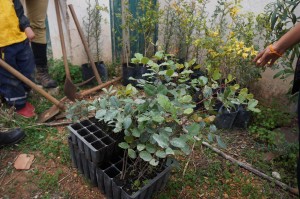Women who inspire – International women’s day
Since the early part of the 20th Century there has been a day when people have come together to celebrate and mark the changes that have occurred in women’s lives. International Women’s Day (IWD) emerged from the activities of labour movements in North America and across Europe. By 1975, during International Women’s Year, the United Nations began celebrating International Women’s Day on 8th March. It is day that many countries mark and it is a day celebrated by men and women. The tradition in some countries sees men honouring their mothers, wives, girlfriends, colleagues, etc with flowers and small gifts.
Women’s organisations and governments across the world also observe IWD annually on 8th March by holding events that honour women’s advancement.
In recent times there has been a noticeable shift in both women’s and society’s thoughts about women’s roles. In many countries, there clearly have been improvements in women’s lives. There are female astronauts, prime ministers, girls attend University in record numbers and women can work and have a family. Some women now have choices. So the tone and nature of IWD has, for the past few years, moved from being a reminder of what is still to be done, to a celebration of what has been accomplished. Increasingly, International Women’s Day is a time to reflect on progress made, to call for continued improvement in women’s lives and to celebrate acts of courage and determination by ordinary women who have played an extraordinary role in their communities. If you want to come and celebrate women on IWD, then come to Tavira library on the 8th March at 11am. There will be cards and ribbons available. You can write on the card the name of a woman who has inspired you and then tie your card on a tree in the reception area. There will also be a display of books and information.
There are numerous examples of women who should be celebrated. Here are just four, local women, whose work enhances all our lives.
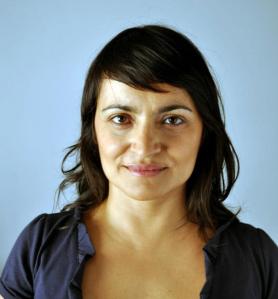
Sandra Fisher Martins has created an organization that promotes the use of plain language in official documents. She helps Portuguese businesses and government agencies, introduce clarity into their communications. When studying in England she was inspired by what the Plain English campaign was doing. This motivated her to establish Portugues Claro, a consulting and training firm that works to ensure that people are not disenfranchised by what she calls”information apartheid”. She feels this “information apartheid”. keeps the majority of people from fully understanding documents they need for their daily lives.
Sandra is not only interested in the use of plain language, but also how information is designed in public documents, so that people can make informed choices about their health, education, welfare, and civil rights. Her clients include the Government, Inland Revenue, Social Security, Caixa (Portugal’s largest bank) and ZON (telecommunications).
A couple of her successes have been, rewriting the scripts for the social security call centres and plain summaries of laws. The plain summaries of laws, was a way that ordinary people could begin to understand the implications of new laws. This public service was not necessarily welcomed by lawyers and it was stopped once the Portuguese Conservative government took office. This blockage has not stopped Sandra’s passion. She is now taking her campaign to Brazil. She is also working to develop Euro-clear, a European diploma in clear communication.
Sandra gave a inspiring talk at TEDx talk in Porto in 2011 about ‘The right to understand’. It was chosen as ‘Editor’s Pick’ in October 2011 and put on the TED homepage. To date it has been viewed over 396,500 times. TED talk
There are more examples of how she works with plain language on the Portugues Claro‘s website.
Tela Leão is a cultural programmer or a performing arts curator, based in Tavira. She believes that art is the best bridge “between souls and the best tool to overcome the differences of culture”, She sees this work as a way to challenge people from different origins or cultures or neighbourhoods to work together, to see and find common ground, to enjoy the experience and create brilliant pieces of art that will drive us through gestures and signs, directly into the “genome of the human soul”.
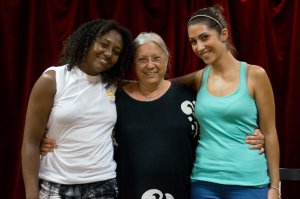
She does this work because her ideal world is one of tolerance, solidarity, kindness and compassion. She says it is “an almost silly dream… I know”. But “we do have to learn and understand that in some cultures to take off your hat is a sign of respect while in others one shows respect by keeping the head covered”. She is inspired by the way small children face the world before they start “being taught”. “Before they understand words and before they are introduced to the concepts of ownership” and obligatory sharing they are just curious creatures that enjoy each other’s company. They are naturally honest and therefore ethical”.
She says she was inspired by her father. He was “like a big heart, inhabited by a brilliant mind and the most generous soul”.
Being an artist has not always been easy though, she says “many times I have been confronted with situations where I had to choose a side, and I chose to always stand by honest, ethical and transparent behaviour. This choice has made her lose jobs and opportunities, but she says “it has also helped me to sort out my true friends”.
Tela produces a weekly arts update of “what’s on” in Tavira. She also co-ordinates Tavira Ilimitada. This is a network of people and organisations who are working together, to breakdown the barriers to cultural understanding. Tavira Ilimitada on Facebook
Paula Ferreira is the Director of the Library in Tavira. Álvaro de Campos Municipal Library. She is also a partner is the cafe Pessoa. She is a shy and unassuming woman who tirelessly facilitates educational activities at the Library.
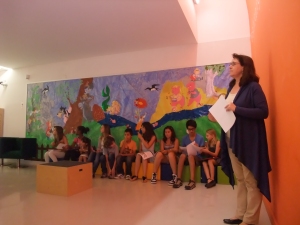
The women that have inspired her are Lou Andreas-Salomé, Hannah Arendt, Virginia Woolf. She says “I remember when I was young, that reading them gave me strength to fight and follow my life on my own terms, being independent and realizing that in education, thinking and discussing, there lies the possibility of understanding and evolution. Being aware that what surrounds you manipulates much more than we think……… and the only way is knowing, being aware, developing the capacity of understanding and participation”. During the week of the 7th to the 9th of March there will be story telling with “Maré de Contos” and some workshops in the library (and in Cenas (an arts group) and Pessoa’s), as well as the tree celebration
Sra Valentina has been baking since she was 7 years old. She worked for 10 years out of her parent’s house in Juncais, to create a successful baking enterprise. 13 years ago she moved to her own premises and now employs 8-10 women. She makes cakes for shops and café’s from Villa Real to Albufeira. The shop is somewhat hidden away in Sao Bras Alportel, but everyone seems to know where Casa Ti Marquinhas is located. The shop is full of old Portuguese cooking pots and cork containers, along with clean cabinets with traditional carob, almond and fig cakes. She feels it was easy to follow her passion for cake making.
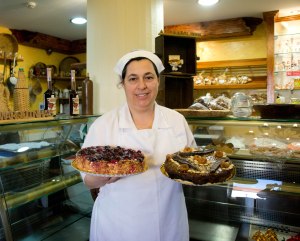
She says she “keeps in her mind that people love her cakes and it is a good product” connected to what is produced both in Sao Bras and across the Eastern Algarve. At the weekends she often makes up to 15 cakes by herself, for parties. She says “each new design I create, I try to think through and see how I can make it better than the one before”. Next time you eat a bolinhas de amêndoa, perhaps, take a moment to think about the skill and perseverance of Sra Valentina.
